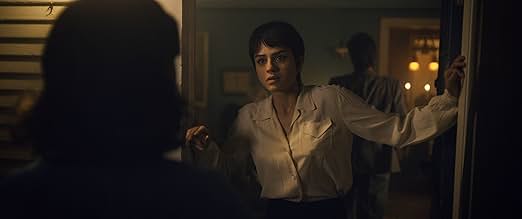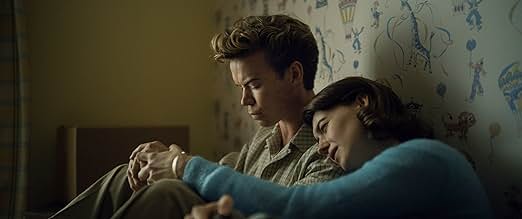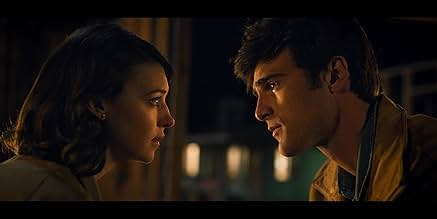Muriel et son mari Lee sont sur le point de commencer une nouvelle vie brillante, qui est bouleversée par l'arrivée du frère de Lee. Muriel se lance dans une vie secrète, jouant sur des chev... Tout lireMuriel et son mari Lee sont sur le point de commencer une nouvelle vie brillante, qui est bouleversée par l'arrivée du frère de Lee. Muriel se lance dans une vie secrète, jouant sur des chevaux de course et découvrant un amour.Muriel et son mari Lee sont sur le point de commencer une nouvelle vie brillante, qui est bouleversée par l'arrivée du frère de Lee. Muriel se lance dans une vie secrète, jouant sur des chevaux de course et découvrant un amour.
- Réalisation
- Scénario
- Casting principal
- Récompenses
- 6 nominations au total
Andrew Keenan-Bolger
- Rosie
- (as Andrew Keenan Bolger)
Avis à la une
USA FILM FESTIVAL
Greetings again from the darkness. One need only watch a couple of episodes of "Leave it to Beaver" to comprehend just how ideal and perfect family life in the 1950's was. Only that was a Hollywood façade and real life was much different, especially for anyone who wasn't a straight white male ... and even many of those served in the military during the Korean War and/or faced the pressure of being the sole breadwinner. Daniel Minahan (known mostly for his TV work) directs the screenplay from Bryan Kass (LIZZIE, 2018) who adapted the 2019 novel from Shannon Pufahl.
Daisy Edgar-Jones (TWISTERS, 2024) stars as Muriel, a young woman who reluctantly accepts the wedding proposal from Lee (Will Poulter, DEATH OF A UNICORN, 2025; MIDSOMMAR, 2019). In keeping with the times, Lee assumes his dreams of a new house in the growing suburbs of California are shared by his new partner ... so he's a bit annoyed by her reluctance to sell her childhood Kansas house she inherited from her recently deceased mother. A third wheel pops up in the form of Lee's rudderless younger brother Julius (Jacob Elordi, PRISCILLA, 2023), who has recently been discharged from the Navy.
An intriguing connection forms between Muriel and Julius, and it continues playing out through the entirety of the story. While Lee strives for the traditional American dream, Julius and Muriel separately maneuver through their own internal emotions that don't easily slide into the life respectable folks are expected to follow. Both have a bit of hustler in them as Muriel uses her alert ears during shifts as a diner waitress to pick up tips on the next horse race, while Julius capitalizes on his casino surveillance job - one that brings him money and love.
Two excellent supporting roles are courtesy of Diego Calva (BABYLON, 2022) and Sasha Calle (THE FLASH, 2023). To disclose specifics would be to reveal spoilers that I refuse to serve up. What I can say is the story takes us from Kansas to California to Las Vegas to Tijuana. Along the way, we witness the challenges faced by those out of step with society. We see the deceits required as these characters walk the line between what's expected and the path to follow their own dreams. It can be heartbreaking and frustrating, and Minahan's film expertly shoots down the façade of the perfect 50's. The acting is superb, with Daisy Edgar-Jones seamlessly capturing the look of the era, while Jacob Elordi beautifully fulfills the more difficult role. This is a film for those who appreciate climbing inside the characters to understand their longing.
Now playing in theaters.
Daisy Edgar-Jones (TWISTERS, 2024) stars as Muriel, a young woman who reluctantly accepts the wedding proposal from Lee (Will Poulter, DEATH OF A UNICORN, 2025; MIDSOMMAR, 2019). In keeping with the times, Lee assumes his dreams of a new house in the growing suburbs of California are shared by his new partner ... so he's a bit annoyed by her reluctance to sell her childhood Kansas house she inherited from her recently deceased mother. A third wheel pops up in the form of Lee's rudderless younger brother Julius (Jacob Elordi, PRISCILLA, 2023), who has recently been discharged from the Navy.
An intriguing connection forms between Muriel and Julius, and it continues playing out through the entirety of the story. While Lee strives for the traditional American dream, Julius and Muriel separately maneuver through their own internal emotions that don't easily slide into the life respectable folks are expected to follow. Both have a bit of hustler in them as Muriel uses her alert ears during shifts as a diner waitress to pick up tips on the next horse race, while Julius capitalizes on his casino surveillance job - one that brings him money and love.
Two excellent supporting roles are courtesy of Diego Calva (BABYLON, 2022) and Sasha Calle (THE FLASH, 2023). To disclose specifics would be to reveal spoilers that I refuse to serve up. What I can say is the story takes us from Kansas to California to Las Vegas to Tijuana. Along the way, we witness the challenges faced by those out of step with society. We see the deceits required as these characters walk the line between what's expected and the path to follow their own dreams. It can be heartbreaking and frustrating, and Minahan's film expertly shoots down the façade of the perfect 50's. The acting is superb, with Daisy Edgar-Jones seamlessly capturing the look of the era, while Jacob Elordi beautifully fulfills the more difficult role. This is a film for those who appreciate climbing inside the characters to understand their longing.
Now playing in theaters.
Be prepared for a lot of butts...both human and cigarettes.
Here's my 2nd "Mystery Movie" (or as AMC calls it, "Screen Unseen.") All I knew was the Rating (R) and length. My guess was "Sinners." Wrong. My friend's guess, and he's almost ALWAYS right, was "The Accountant 2." Also, wrong. In fact, neither of us could be FURTHER from what this movie was.
And I bet this was a very, very big surprise to the almost-packed audience. I had to not-so-secretly smile to all the heterosexuals in the audience who would've never paid to see a LGBTQ+ period piece melodrama...in their lives.
As stated, this movie takes place in the 1950s and explores an unconventional love triangle. Two brothers, two Korean War veterans couldn't be further apart, but still love each other. In-between is one of the brother's wife. All three have dreams...and two of which were really hard to come by with 1950s homophobia.
I liked the movie, there's really nothing wrong here. I like that there were two heartbreaking leads vs. The typical one. The acting was fine and the stakes were real. Was it anywhere close to the similar Brokeback Mountain?
Absolutely not. Not even in the same league. But, it's a good update to how homosexuals struggled in the 1950s. I can't even imagine what it was like then. I will forever salute the brave men, women and everyone who stood up to homophobia to make it easier - no, 1000x easier for future generations.
I don't suspect so, but it would be interesting to see if this gets any award buzz next Awards season. Maybe I'll have to revisit this and see something different. For right now: I did like it, I didn't love it and I didn't regret seeing it.
***
Final Thoughts: I do love to go into a movie cold. Not knowing much about it, other than the title, usually at least one of the leads, maybe genre/subgenre and a recommendation. This is by far, the coldest I've ever experienced. I never once heard of this movie, the background or absolutely anything. In fact, I was worried I wouldn't remember the title since I never heard of this before to write this review. Well, I finally got my #1 wish...to be completely frozen over.
Here's my 2nd "Mystery Movie" (or as AMC calls it, "Screen Unseen.") All I knew was the Rating (R) and length. My guess was "Sinners." Wrong. My friend's guess, and he's almost ALWAYS right, was "The Accountant 2." Also, wrong. In fact, neither of us could be FURTHER from what this movie was.
And I bet this was a very, very big surprise to the almost-packed audience. I had to not-so-secretly smile to all the heterosexuals in the audience who would've never paid to see a LGBTQ+ period piece melodrama...in their lives.
As stated, this movie takes place in the 1950s and explores an unconventional love triangle. Two brothers, two Korean War veterans couldn't be further apart, but still love each other. In-between is one of the brother's wife. All three have dreams...and two of which were really hard to come by with 1950s homophobia.
I liked the movie, there's really nothing wrong here. I like that there were two heartbreaking leads vs. The typical one. The acting was fine and the stakes were real. Was it anywhere close to the similar Brokeback Mountain?
Absolutely not. Not even in the same league. But, it's a good update to how homosexuals struggled in the 1950s. I can't even imagine what it was like then. I will forever salute the brave men, women and everyone who stood up to homophobia to make it easier - no, 1000x easier for future generations.
I don't suspect so, but it would be interesting to see if this gets any award buzz next Awards season. Maybe I'll have to revisit this and see something different. For right now: I did like it, I didn't love it and I didn't regret seeing it.
***
Final Thoughts: I do love to go into a movie cold. Not knowing much about it, other than the title, usually at least one of the leads, maybe genre/subgenre and a recommendation. This is by far, the coldest I've ever experienced. I never once heard of this movie, the background or absolutely anything. In fact, I was worried I wouldn't remember the title since I never heard of this before to write this review. Well, I finally got my #1 wish...to be completely frozen over.
Rating - 5.4:
Overall, a lackluster, Oscar-bait period drama that is about characters exploring their sexuality in a time when it's taboo, but the movie does so in a surface-level way that provides no nuance to the issue and gives you no material to really care about these characters.
Direction - Pretty Bad: The direction on a macroscale feels very similar to other period dramas like this; the direction on a microscale is pretty lackluster because the actors are giving emotion to material that has no substance or nuance; the storytelling is not good because the movie shallowly discusses the topic and doesn't really provide stakes that engage you
Story - Bad to Pretty Bad: The concept is very surface-level and provides no nuance to these characters exploring their sexuality; the horse-racing storyline is poorly incorporated into the plot; the plot structure follows two parallel stories that intersect at points in the story; the two storylines do not really do a good job exploring the relationships of the characters; character writing is bad because it presents these characters exploring their sexuality in such a surface-level way that provides no nuance to why this was taboo in the 1950s, especially for Edgar-Jones' character
Screenplay - Bad to Pretty Bad: The dialogue provides no substance as it is bland and boring; the symbolism is incredibly surface level and provides no nuance to these characters exploring their sexuality, especially Edgar-Jones' character; the foreshadowing is present
Acting - Pretty Bad: Daisy Edgar-Jones - Pretty Bad (Gives a very surface-level performance; she doesn't really explore the character's sexuality at all and does not really have chemistry with any other characters; In a role that really depends on having good chemistry), Jacob Elordi - Decent (Gives a very surface-level performance; does an alright job exploring the character's sexuality, but it feels very forced and presents no nuance to the relationship's taboo; has alright chemistry with Calva, but very forced chemistry with Edgar-Jones), Will Poulter - Decent (Just a very standard, 1950s husband being cheated on, character; he does not really have chemistry with anyone), Diego Calva - Bad (Feels very forced and does not provide nuance to the character; it has very surface-level chemistry with Elordi), Sasha Calle - Decent to Pretty Good (Probably the best performance for the movie, which isn't saying a lot, because her character is somewhat believable and you can tell the struggle she's going through; she tries to build chemistry with Edgar-Jones, but it isn't reciprocated on the same level), Rest of the cast - Pretty Bad (Just a bunch of formulaic period drama performances)
Score - Decent: Helps set the tone
Cinematography - Pretty Good: The movie is well-shot and feels polished
Editing - Pretty Good: Feels polished and well-edited
Sound - Pretty Good
Visual Effects - Pretty Bad: The fact that they had to CGI the horses shows what is wrong with Hollywood right now
Pacing - Pacing is very slow because it doesn't feel like anything is happening; I would have liked to have seen them add more time to explore these parallel storylines and provide more depth, or just cut one of the storylines altogether
Climax - Climax is decent for how heartwarming it is
Tone - Tone feels like a typical period drama that's Oscar-bait;
Final Notes - Saw the U. S. premiere at SXSW.
Direction - Pretty Bad: The direction on a macroscale feels very similar to other period dramas like this; the direction on a microscale is pretty lackluster because the actors are giving emotion to material that has no substance or nuance; the storytelling is not good because the movie shallowly discusses the topic and doesn't really provide stakes that engage you
Story - Bad to Pretty Bad: The concept is very surface-level and provides no nuance to these characters exploring their sexuality; the horse-racing storyline is poorly incorporated into the plot; the plot structure follows two parallel stories that intersect at points in the story; the two storylines do not really do a good job exploring the relationships of the characters; character writing is bad because it presents these characters exploring their sexuality in such a surface-level way that provides no nuance to why this was taboo in the 1950s, especially for Edgar-Jones' character
Screenplay - Bad to Pretty Bad: The dialogue provides no substance as it is bland and boring; the symbolism is incredibly surface level and provides no nuance to these characters exploring their sexuality, especially Edgar-Jones' character; the foreshadowing is present
Acting - Pretty Bad: Daisy Edgar-Jones - Pretty Bad (Gives a very surface-level performance; she doesn't really explore the character's sexuality at all and does not really have chemistry with any other characters; In a role that really depends on having good chemistry), Jacob Elordi - Decent (Gives a very surface-level performance; does an alright job exploring the character's sexuality, but it feels very forced and presents no nuance to the relationship's taboo; has alright chemistry with Calva, but very forced chemistry with Edgar-Jones), Will Poulter - Decent (Just a very standard, 1950s husband being cheated on, character; he does not really have chemistry with anyone), Diego Calva - Bad (Feels very forced and does not provide nuance to the character; it has very surface-level chemistry with Elordi), Sasha Calle - Decent to Pretty Good (Probably the best performance for the movie, which isn't saying a lot, because her character is somewhat believable and you can tell the struggle she's going through; she tries to build chemistry with Edgar-Jones, but it isn't reciprocated on the same level), Rest of the cast - Pretty Bad (Just a bunch of formulaic period drama performances)
Score - Decent: Helps set the tone
Cinematography - Pretty Good: The movie is well-shot and feels polished
Editing - Pretty Good: Feels polished and well-edited
Sound - Pretty Good
Visual Effects - Pretty Bad: The fact that they had to CGI the horses shows what is wrong with Hollywood right now
Pacing - Pacing is very slow because it doesn't feel like anything is happening; I would have liked to have seen them add more time to explore these parallel storylines and provide more depth, or just cut one of the storylines altogether
Climax - Climax is decent for how heartwarming it is
Tone - Tone feels like a typical period drama that's Oscar-bait;
Final Notes - Saw the U. S. premiere at SXSW.
10thebwort
On Swift Horses is a film about social control; how dominant collective ideology puts us in boxes and forces us to perform the status quo. As such, it's going to alienate a less discerning audience who, to be fair, have never questioned anything within their social lexicon.
Whilst the other user reviews on here currently denote mainly the dangers in trying to introduce a film with a bit of meaning to the kind of people who watch maybe 10 movies per year (and, in particular years, 6 of those movies are Top Gun: Maverick) at a Cineplex promo screening best suited for crap starring Jason Statham, I can assure you that it is a very intentional and very thoughtful film.
It's about the balance between being true to oneself and appeasing those around you out of fear of isolation and rejection; the gradual evaluation and awareness of such in one's own life and the amount of sacrifice that assimilating to your socio-economic peer group can entail.
The plot of the film is already described in the synopsis and to say much more than that may inadvertently spoil it.
Admittedly, the pacing is deliberate and the tone sombre, which, again, will alienate those who stare at Instagram reels all day. But for those who appreciate film whose form matches its content and that doesn't patronize its audience, they will find it rewarding.
This is a film about nuance; about reading non-verbal cues; and, as the title suggests, about the balance between personal freedom and being a controlled rider of your own journey.
We all have to decide if we want to race and enjoy it or take cautious steps without risk.
Whilst the other user reviews on here currently denote mainly the dangers in trying to introduce a film with a bit of meaning to the kind of people who watch maybe 10 movies per year (and, in particular years, 6 of those movies are Top Gun: Maverick) at a Cineplex promo screening best suited for crap starring Jason Statham, I can assure you that it is a very intentional and very thoughtful film.
It's about the balance between being true to oneself and appeasing those around you out of fear of isolation and rejection; the gradual evaluation and awareness of such in one's own life and the amount of sacrifice that assimilating to your socio-economic peer group can entail.
The plot of the film is already described in the synopsis and to say much more than that may inadvertently spoil it.
Admittedly, the pacing is deliberate and the tone sombre, which, again, will alienate those who stare at Instagram reels all day. But for those who appreciate film whose form matches its content and that doesn't patronize its audience, they will find it rewarding.
This is a film about nuance; about reading non-verbal cues; and, as the title suggests, about the balance between personal freedom and being a controlled rider of your own journey.
We all have to decide if we want to race and enjoy it or take cautious steps without risk.
My wife and I watched On Swift Horses (2024) in theaters. The story follows two individuals entangled in complicated relationships-with others and with themselves. As they navigate a journey of self-discovery, they begin to realize that their shared sexual fluidity may be what ultimately draws them together.
Directed by Daniel Minahan (Deadwood: The Movie), the film stars Daisy Edgar-Jones (Normal People), Jacob Elordi (Euphoria), Will Poulter (We're the Millers), and Diego Calva (Babylon).
This is a well-crafted period piece that captures the era beautifully, especially in its portrayal of societal expectations and norms. The acting is top-tier-each actor is well-cast and fits their role convincingly. The premise has real potential, and the film thoughtfully explores the internal struggles and evolving identities of its characters.
That said, the love story didn't resonate as strongly as I'd hoped. Some of the chemistry feels authentic, while other relationships fall flat and lack the depth they seem to be reaching for. By the end, the film leaves you wanting more-emotionally and narratively.
In conclusion, On Swift Horses is a smart and well-executed film that doesn't quite hit its full potential. I'd give it a 6/10 and recommend seeing it once.
Directed by Daniel Minahan (Deadwood: The Movie), the film stars Daisy Edgar-Jones (Normal People), Jacob Elordi (Euphoria), Will Poulter (We're the Millers), and Diego Calva (Babylon).
This is a well-crafted period piece that captures the era beautifully, especially in its portrayal of societal expectations and norms. The acting is top-tier-each actor is well-cast and fits their role convincingly. The premise has real potential, and the film thoughtfully explores the internal struggles and evolving identities of its characters.
That said, the love story didn't resonate as strongly as I'd hoped. Some of the chemistry feels authentic, while other relationships fall flat and lack the depth they seem to be reaching for. By the end, the film leaves you wanting more-emotionally and narratively.
In conclusion, On Swift Horses is a smart and well-executed film that doesn't quite hit its full potential. I'd give it a 6/10 and recommend seeing it once.
Le saviez-vous
- AnecdotesBased on the novel of the same name by Shannon Pufahl. The character of Muriel (played in the film by Daisy Edgar-Jones) was inspired by Pufahl's grandmother and her experiences in the world of gambling in the 1950s.
- Bandes originalesMr. Blue
Written by DeWayne Blackwell
Performed by Loren Kramar featuring Amber Coffman and Zsela
Guitar Solo by Sean O'Brien
Produced by Sean O'Brien
Courtesy of Secretly Canadian
Meilleurs choix
Connectez-vous pour évaluer et suivre la liste de favoris afin de recevoir des recommandations personnalisées
- How long is On Swift Horses?Alimenté par Alexa
Détails
Box-office
- Montant brut aux États-Unis et au Canada
- 1 030 558 $US
- Week-end de sortie aux États-Unis et au Canada
- 542 360 $US
- 27 avr. 2025
- Montant brut mondial
- 1 174 247 $US
- Durée1 heure 59 minutes
- Couleur
Contribuer à cette page
Suggérer une modification ou ajouter du contenu manquant




































